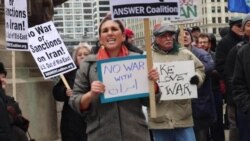Iranian students donned prison stripes, placed hoods over their heads, and chained themselves together on U.S. colleges and universities in silent political protest of U.S.-Iran policies in the 1980s.
Their children, who are Iranian by heritage or international students, say they are too afraid to protest in the U.S. now, fearing hate crimes or immigration difficulties that will curtail their studies.
"Older Iranians and Americans talk about Iranian students and how politically visible they were in the U.S.," explained Mana Kharrazi, executive director of Iranian Alliances Across Borders, who was born in Iran but emigrated to the U.S. with her parents when she was 4 years old. "That's just not the reality now. The reality is it's become a nightmare."
Younger Iranians, students and emigres in the U.S. say the latest political turmoil — last week the U.S. conducted a targeted killing of a powerful Iranian military strongman in Iraq, and political violence threatens to spread internationally — has darkened their lives, studies and careers in the U.S.
"The propaganda that comes with preparation for any war makes Iranians in the U.S. particularly vulnerable," tweeted Sam Sinai, who graduated from the Massachusetts Institute of Technology (MIT) before earning a doctorate at Harvard University in 2019. "It can be scary to be from a country that is demonized on TV every day at a time where immigrants are generally pictured as a threat."
Kharazzi says Iranian students come to the U.S. to study and work "for the same reasons other folks do: We have some of the best institutions here." But the combination of turmoil and insecurity in Iran, heightened tensions between the two countries, hate crimes and political rhetoric in the U.S. against Muslims and immigrants from the Middle East, takes a toll on students who seek high-quality education, freedoms and opportunity in the U.S.
She cited a 2013 incident when University of Minnesota students from Iran had their bank accounts closed without explanation after the U.S. tightened sanctions against Iran. Without bank accounts, students could not conduct transactions like tuition payments, reported Minnesota Public Radio.
Single-entry visas
Kharrazi and Sinai pointed to reports that Iranian students are receiving single-entry visas, which constrict their travel to and from the U.S., "which means apart from the stresses of graduate school, and this never-ending cycle of conflict, they cannot visit their parents," wrote Sinai.
"Personally, I'm lucky enough to have a great support system. But I also see the extent of suffering that goes on in our community. There is anger, confusion, anxiety and depression," he wrote from Cambridge, Massachusetts.
VOA reached out to several Iranian student associations in the U.S. but none responded. Kharrazi said students today are unlikely to speak publicly given immigration difficulties, delayed border crossings and threat of expulsion. In September 2019, the start of the academic year, some Iranian students had their visas to the U.S. canceled at the airport in Tehran, according to news reports.
International students normally enter the U.S. on F-1 or M-1 visas, which allow multiple entries, meaning they can go to their home countries and return for school without having to apply again. When they graduate, they can work in their field for up to three years under Optional Practical Training (OPT) status. And those who enter on J-1 visas are exchange visitors that include physicians, specialists, teachers, professors and research scholars, according to the U.S. Department of State.
Single-entry visas are, as they say, for one entry. Students must renew them if they are issued for less than the duration of study, and students of many nationalities lament that they have to reapply and pay additional processing fees each time. In the November 2019 Open Doors report, conducted by the Institute for International Education and funded by the State Department, international students and colleges and universities around the U.S. cited immigration and visa difficulties as reasons for opting to study in countries other than the U.S.
Competing for students
While international students from China and India comprised more than half of the more than 1 million international students in the U.S. last year, Iran is No. 13 on the list of sending countries, dispatching 12,141 students to the U.S. That was a 5% decrease from the previous year. The United Kingdom, Germany and France send less.
Meanwhile, countries competing for intellectual immigrants are making it easier for Iranian students to attend school there. At McGill University in Montreal, the website declares in bright red that "January application deadlines will be extended for all Iranian applicants." New enrollment in Canada increased more than 16% last year and 73% over five years for international student enrollment, according to the Canadian Bureau for International Education.
Students enrolling in Canadian schools cite "Canada's reputation as a tolerant and non-discriminatory society," and its "reputation as a safe country."
Kharazzi said that the large Persian diaspora in the U.S., mostly anchored in Los Angeles, is another draw for students coming from Iran.
"It's easier to move to a country where you have friends and family," Kharazzi said. "It has been a love story, culturally, between the U.S. and Iran. I think it's unfortunate that we've lost sight of that. We've had decades of cultural exchange and that's part of it. "
Sinai said students at U.S. schools should "remind [Iranian] students that they have a community beyond other Iranians that they can share these emotions with, and where they are safe."
"In these volatile times, do spare a thought for students of Iranian origin, especially those studying in the U.S. The past decade was devastating for most of us who had close ties to Iran, no matter what political background we came from," Sinai tweeted.
"It's only recently that Iranians once again are feeling like they did after the hostage crisis," Kharazzi said, when 52 Americans were held for 444 days in Tehran until Jan. 20, 1981, by Iranian college students who supported the Iranian Revolution.
"We're not welcome here."





